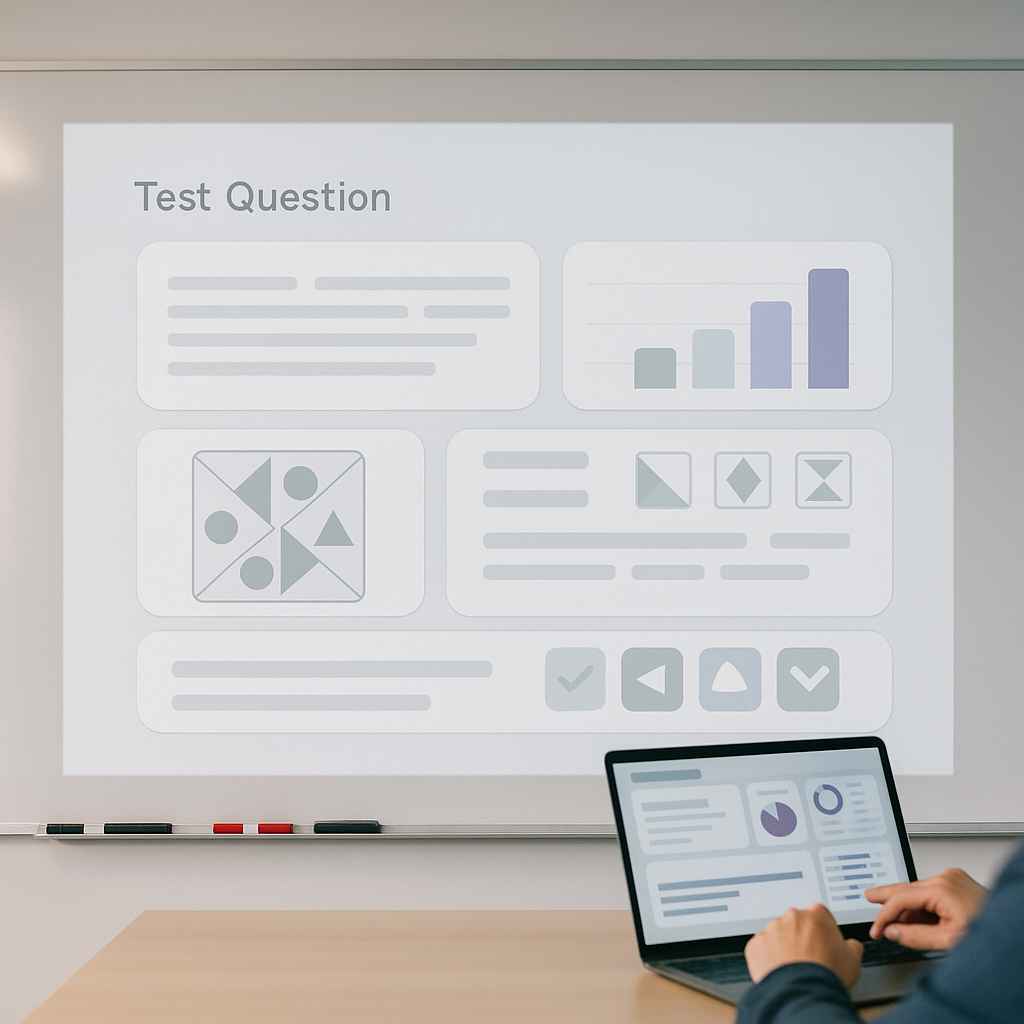Content
If you’ve ever sat across from a candidate who speaks well but later struggles to write a clear email or interpret a written policy, this one’s for you.
Hiring someone who can talk is different from hiring someone who can reason. That’s where verbal reasoning assessment tests come in.
This guide unpacks what a verbal reasoning test really measures, how it’s different from grammar or vocabulary tests, and why employers across industries use it to make smarter hiring decisions. We’ll break down the components, share examples, and explain how the Discovered platform makes it seamless to integrate into your process.
What Is a Verbal Reasoning Assessment Test?
A verbal reasoning assessment test is designed to evaluate how well a candidate can process, understand, and respond to written English. But it’s not about memorizing definitions or grammar rules.
Instead, it focuses on:
- Drawing conclusions from short passages
- Understanding vocabulary in context
- Choosing the correct word or phrase to complete a sentence
- Identifying logical assumptions or flaws in reasoning
It’s a test of how candidates think with language, not just how they use it.
Unlike traditional multiple-choice language exams, this test measures how people make sense of what they read—and how accurately they can reason through it.
Here’s What It Measures:
| Skill | What It Evaluates | Why It Matters |
| Word Meaning | Understanding vocabulary and its usage in context | For clear, professional written communication |
| Sentence Completion | Choosing the correct word or phrase to complete a sentence | For interpreting and constructing grammatically correct messages |
| Logical Deduction | Drawing accurate conclusions from written scenarios | For decision-making and understanding complex material |
This kind of test is especially relevant in leadership roles, customer service, administration, marketing, and any position that requires reading reports, policies, or written instructions.
Why Employers Use Verbal Reasoning Tests

Many hiring teams rely on resumes and interviews to assess communication, but those methods don’t always reveal how someone processes language under pressure.
Here’s where the verbal reasoning test stands out:
- Objective evaluation: Removes bias by scoring everyone against the same set of logic-based criteria.
- Real-world simulation: Mimics how candidates would engage with reports, instructions, and written communication on the job.
- Data-driven clarity: The results offer more than a gut feeling—they give you proof of a candidate’s reasoning ability.
This is especially helpful in roles that require speed and accuracy with written information, like sales, legal, HR, customer service, and executive decision-making.
Related insight: Verbal and Logical Reasoning Tests: How They Work in Executive Hiring
How Discovered’s Verbal Reasoning Test Works
At Discovered Assessments, our Verbal Reasoning Test was designed with real hiring needs in mind, not academic trivia.
Here’s how it works:
- Test Format: 10 questions in 10 minutes
- Test Type: Verbal reasoning, comprehension, and deductive logic
- What It Measures: Word meaning, sentence completion, logical deductions
- Delivery: Share via a secure online link—no downloads required
- Reporting: Instant, clear results for hiring managers
This isn’t a generic aptitude quiz. Each question reflects real workplace situations that reveal how candidates think, decide, and communicate when it counts.
Sample Questions from the Verbal Reasoning Assessment

These examples illustrate the depth and type of thinking the test reveals.
🔹 Word Meaning
Sentence:
The auditor scrutinized the records before signing off.
Question:
What does “scrutinized” most closely mean in this context?
A) Approved
B) Ignored
C) Examined
D) Deleted
Correct Answer: C) Examined
🔹 Sentence Completion
Sentence:
The sales manager was praised for her _____ explanation of the pricing model.
A) vague
B) thorough
C) irrelevant
D) confused
Correct Answer: B) thorough
🔹 Logical Deduction
Passage:
Only employees who complete the onboarding program are eligible for bonuses. Mia hasn’t completed onboarding.
Statement:
Mia is not eligible for a bonus.
A) True
B) False
C) Cannot Say
Correct Answer: A) True
These examples are just a sample. You can see more in Verbal Reasoning Test Sample Questions for Employers or Sample Verbal Reasoning Test Examples for Employer Use.
Which Roles Benefit Most from Verbal Reasoning Tests?

This test is useful across industries, but particularly for roles that rely on written instructions, comprehension, and precise communication.
| Job Role | Why Verbal Reasoning Helps |
| Customer Service & Support | For handling written complaints, scripts, and procedures |
| Administrative Assistants | For accuracy in correspondence and task execution |
| Sales & Marketing | To ensure messaging is clear and aligned |
| Legal & Compliance | For reading policies, contracts, and identifying nuances |
| Leadership & Management | For interpreting reports and making reasoned decisions |
| Civil Service & Law Enforcement | For interpreting written procedures and rules |
How It Fits into Your Hiring Process
Here’s the 3-step process with Discovered:
- Send the Test Link
No setup or downloads—just send a secure link. - Let Candidates Complete It
They’ll complete 10 questions in ~10 minutes. - Review Instant Reports
See how they scored on each verbal reasoning dimension, with breakdowns by word meaning, sentence structure, and deduction accuracy.
Many hiring teams use this test alongside other assessments like the Cognitive Ability Test or Matrix Reasoning Test to build a more complete picture.
More Than Just a Language Test
While it focuses on language and logic, the verbal reasoning test is deeply connected to overall cognitive performance. That’s why we often recommend bundling it with the Numerical Reasoning Test or Cognitive Ability Test for a full assessment of candidate potential.
To dive deeper into this connection, see Verbal Reasoning in Cognitive and IQ-Based Hiring Tests.
Related Pages You Might Find Helpful
- Verbal and Non-Verbal Reasoning Tests: What Employers Need to Know
- Psychometric Verbal Reasoning Tests in Pre-Employment Screening
- Best Verbal Reasoning Testing Tools for Hiring Teams
- Verbal and Logical Reasoning Tests: How They Work in Executive Hiring
FAQ: Verbal Reasoning Tests in Hiring
Q1: Is this test suitable for entry-level roles?
Yes—our platform lets you tailor the difficulty level and focus area based on the role.
Q2: Can I use the test for high-volume hiring?
Absolutely. Our automated platform handles distribution and scoring efficiently.
Q3: Does it work for non-native English speakers?
Yes, as long as the role requires working in English. The test is designed to assess comprehension, not fluency.
Q4: What’s the difference between verbal reasoning and communication skills?
Verbal reasoning tests how someone processes language. Communication skills test how they use it. Both are important—but different.
Final Thoughts
Verbal reasoning is more than just a nice-to-have. It’s a window into how candidates think, how they absorb information, and how they’ll handle communication-heavy tasks.
Whether you’re hiring for a client-facing role or a leadership position, this assessment cuts through the noise and shows you who can truly reason through complexity.
With Discovered’s Verbal Reasoning Assessment, you can:
- Hire with clarity
- Remove guesswork
- And build a smarter, sharper team
👉 Book a Free Demo and see how simple it is to upgrade your hiring with better reasoning data.
